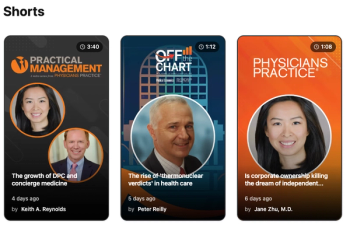
- Physicians Practice July 2024
- Volume 2
- Issue 7
Patients share the blame
Patients aren't blameless in the current state of health care in America.
It is easy to blame doctors for the
I have a friend who gets his primary care via urgent care and non-urgent grocery store care. He is overweight and pre-diabetic. When I tell him he needs to establish a relationship with a primary care doctor, he tells me he has to
So, he goes to urgent care. And six months later, when he should be seeing ‘his’ primary care doctor, he tells me it takes too long to get a new patient appointment and goes to urgent care instead. The cycle continues.
Myth #1: A shortage of primary care physicians is why fewer patients have primary care physicians. There is a shortage. Patients cannot use it as an excuse not to have one. Yes, one may have to wait for a new patient appointment, but isn’t waiting a part of everyday life? I get in line in the grocery store, I make an appointment six months in advance for my annual HVAC maintenance.
Myth #2: Physicians are rushed, but patients aren’t. Gone are the days when patients are made to show up thirty minutes early for a fifteen-minute appointment, but many a patient remains remarkably impatient and inconsiderate. It’s okay for you to spend more time with her, but don’t you dare spend more time with the patient ahead of her on the schedule.
While there is truth to some physicians rushing through appointments, I have not experienced such care. Physicians who rush through appointments and do not listen with both their eyes and ears should strive to do better.
Myth #3: Convenience trumps quality. Bull. A zip tie or duct tape will hold a car fender on for a while. A once-over, symptom-driven exam at an urgent care may get me a prescription – antibiotics cure everything – without taking my underlying health into consideration. Short-term fixes often create long-term issues.
Myth #4: Patient portals are calming. I call them impatient portals. Patients know their test results before their doctors do, call their doctors immediately, and expect immediate guidance.
On Friday, we had a patient in our infusion suite who had just found out via the patient portal her husband’s scans showed cancer…mere seconds after the results were posted online. The damned portal sends notifications when results are posted. It puts physicians and their employees in an unfair position, in my opinion.
********
Good care is good enough for patients until they need great care. Getting convenient care is more important than waiting for great care. But when a health issue that has been ignored, missed and/or unmanaged becomes an issue, these same patients want to move to the front of the line and be prioritized.
When my air conditioning fails in the middle of the night or on a weekend, I pay a premium for after-hours service. And if I don’t have an existing relationship with an HVAC company, I wait in the back of their line. Healthcare is no different.
I do believe we are part of the problem. I believe we can do better. And I believe patients share the blame for where healthcare is going.
Lucien W. Roberts, III, MHA, FACMPE, lived on the healthcare hamster wheel for many years.As he nears retirement, he avoids hamster wheels, the Mad Hatter tea cup ride at Disney World, and anything else that unsettles him.
Articles in this issue
over 1 year ago
Medical practice valuationsover 1 year ago
Afternoon blahs: Time for short bursts of exerciseNewsletter
Optimize your practice with the Physicians Practice newsletter, offering management pearls, leadership tips, and business strategies tailored for practice administrators and physicians of any specialty.






